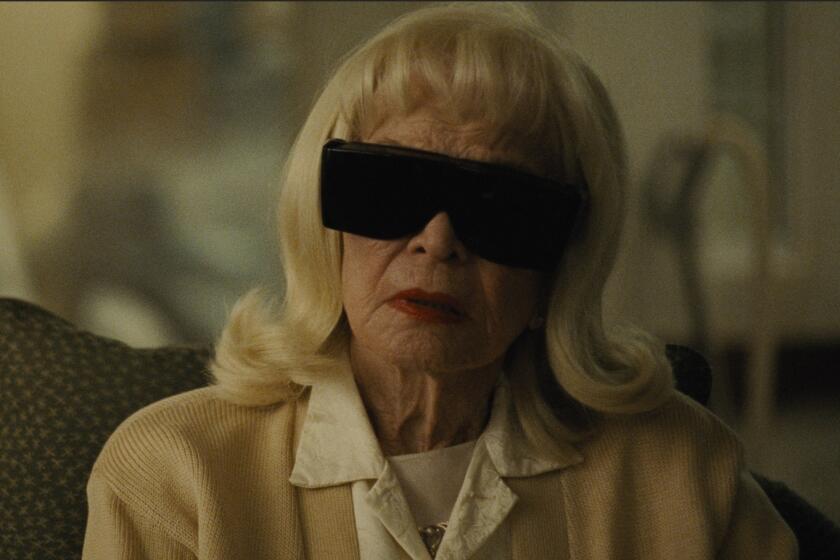Hit Movie Rings True in China
The hottest movie in China these days is “Cellphone,” a dark comedy about a morally bankrupt TV talk show host who lies, cheats and schemes his way through life using his feature-laden cellphone.
Over the course of 140 minutes, the main character, Yan Shouyi, deletes text messages, switches off his phone, turns it to silent mode, and claims to be “in an important meeting” -- all in an effort to keep his wife, girlfriend and lover from finding out about one another.
The film’s depiction of suspicion, deception and mobility have hit such a realistic chord with Chinese audiences that “Wo zai kaihui,” or “I’m in a meeting,” has become a running social joke.
As China lurches into the 21st century, few things capture its people’s frantic search for meaning, prosperity and self-expression better than the cellphone. And the movie illustrates how the device has exposed the growing gap between the values of the closed, largely rural China of the past and the technology that represents the slick, increasingly urban nation of the future.
“ ‘Cellphone’ Leads to Trust Crisis,” blared a headline in the Beijing Daily Messenger.
“Blockbuster Stirs Mistrust Between Couples,” screamed another headline on Xinhua Net.
Critics and viewers attribute the film’s success to a thoughtful script and director Feng Xiaogang’s eye for the everyday concerns of his Chinese audience.
“The movie says a lot about real life,” said He Xiaole, 21, who works in a sports promotion company. “He captured a lot of things people really worry about.”
Chinese movies until recently were restricted to “broad and socially uplifting” themes. In the early 1980s, the hit film “Long Live Youth” by director Huang Shuqin portrayed a model high school student leading her classmates on to a brighter future.
A decade later, “Jiao Yulu,” by director Wang Jixing, delighted audiences with the tale of a local Communist Party secretary who poured his heart and soul into helping the nation, despite a serious illness.
This year, however, the buzz is about “Cellphone.” The film explores several timely issues, including the new technology’s impact on male-female relations, the growing acceptance of extramarital affairs and the loss of traditional values in China’s headlong race for material success.
Think of a slightly darker version of “You’ve Got Mail,” which in the 1990s explored the Internet’s impact on relationships. “Cellphone” has elbowed aside “Harry Potter and the Chamber of Secrets,” “Finding Nemo” and “The Matrix Revolutions” to top China’s film charts.
The inspiration for “Cellphone” came during a brainstorming session, Feng said in an interview in his Beijing penthouse office, crowded with producers, scriptwriters, assistants and a well-used pool table. As so often happens, the brainstorming session was interrupted repeatedly by ringing cellphones, prompting a “eureka” moment.
“It was in everyone’s eyes, but under no one’s pen,” Feng said.
The movie’s opening scene shows rural villagers waiting in line to use the town’s lone public phone, guarded under lock and key by an attendant. That was during the Cultural Revolution. The movie fast-forwards 30 years to a wife answering her husband’s forgotten cellphone in their living room and hearing another woman’s voice.
Today, China is saturated with cellphones. With 280 million registered users and growing, roughly twice the U.S. number, the country’s cellphone revolution has embraced the needs of a new generation -- from migrant workers to corporate executives.
At the high end, features-laden models costing upward of $1,000 provide a tangible way to say, “I’ve made it.” More utilitarian offerings represent a tool well suited to China’s increasingly changing relationships.
As the movie illustrates, cellphones are helping to transform romantic relationships. In a society where public displays of affection are a relatively new phenomenon, China’s lovers have embraced SMS, or short message service. Text messages allow people to express their feelings without fear of being openly rejected or embarrassed, said Craig Watts, general manager with Beijing-based Norson, a technology consulting firm.
“The sexual and mobile revolution go hand in hand,” Watts said. “Cellphones combine the anonymity of the Internet with complete portability.”
The film’s main character, Yan, played by well-known actor Ge You, is the host of a talk show called “To Tell the Truth” -- while telling anything but the truth in his private life.
“After we learn to speak, it becomes easier to lie,” Yan says during a reflective moment. “All you have to do is move your lips.”
During one scene, Yan rejects an incoming call from his lover while he gets a foot massage with his girlfriend. In another scene, he tells his girlfriend that he’s in a meeting when he’s really with his ex-wife after she gave birth to their child. Later, the dejected girlfriend confronts Yan with an incriminating picture -- with his lover -- sent electronically on his cellphone.
Audiences have focused so intently on the film’s depiction of marital deception that the director, lead actor and scriptwriter have found themselves defending their own relationships as solid.
For many viewers, the film hits a bit too close to home.
China’s ever-vibrant Internet chat rooms spout tales of couples fighting or breaking up after seeing the film. Newspapers detail a Tianjin woman who insisted on checking her husband’s cellphone messages after they left the cinema, a challenge that reportedly so enraged him that he cracked her over the head with his handset, landing her in the hospital.
Yang Tao, a 30-year-old information technology worker, says he recently landed in hot water after mistakenly sending a text message to the wrong girlfriend.
“Now I keep two separate numbers,” he said
Marriage experts have chimed in to reassure the public that stable relationships are no enemy of the cellphone, despite a line in the film comparing the devices to hand grenades.
That’s not an association that cellphone makers exactly welcome in the world’s largest mobile-telephone market. Top executives from several leading handset makers countered after a private viewing that cellphones are props, not leading actors, in the battle of the sexes.
Still, they reassured buyers that they’re working overtime on various for-your-eyes-only security features -- including enhanced encryption, caller ID restrictions, password-protected voice mailboxes and iris scanning -- to ensure that private matters stay that way.
That’s the wrong lesson to come away with, counter some viewers, who argue that the best way to stay out of trouble is to be honest.
“I trust my boyfriend,” said Zhang Xin, 26, a real estate broker. “Trust between couples has nothing to do with cellphones.”
Sung Chiming, 40, a fashion industry worker in Beijing, said he saw “Cellphone” with his wife -- at her insistence. “I think women react more strongly to this movie than men and think there’s a lot they need to watch out for,” he said. “In reality, though, both men and women have affairs, even though the movie is mostly about men.”
While the movie shows several characters having or thinking about affairs, China in many ways is merely catching up with international norms, marriage experts say. For decades, monogamy was virtually required under a government whose reach extended well into people’s bedrooms. Until last October, for instance, Chinese still needed their employer’s permission to get married, and it wasn’t too long ago that the whiff of an affair could jeopardize one’s career, status and paycheck.
According to a survey by sociologist Li Yinhe of the Chinese Academy of Social Sciences, more than 60% of Chinese now admit to having an affair at some point during marriage, compared with 15% in the late 1980s.
At the film’s end, the main character throws his cellphone onto a relative’s funeral pyre in disgust -- a gesture most Chinese are not likely to follow.
“My husband sometimes lies over the phone,” said Hao Hao, 36, an accountant who saw the movie.
“Cellphones can be troublesome, but I can’t imagine ever giving mine up.”
*
Yin Lijin in The Times’ Beijing Bureau contributed to this report.
More to Read
Only good movies
Get the Indie Focus newsletter, Mark Olsen's weekly guide to the world of cinema.
You may occasionally receive promotional content from the Los Angeles Times.










